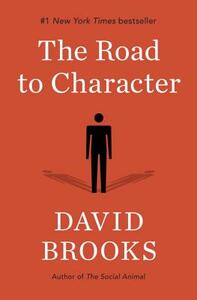Take a photo of a barcode or cover
David Brooks explores what it means to become a person of (good) character by dissecting the lives of a handful of historical figures who are generally well esteemed as "moral giants." Brooks' insights into character formation are interesting on their own but not necessarily novel reads if you follow his writing in the NY Times. To me, the highlight of this book was that it was like reading an anthology of biographies.
I listened to this book a few months ago while I was on the road, and it keeps coming to mind. Partly because I kept remembering I hadn't rated it on this forum yet, but mostly because it's awesome. With so many going to extremes in search of a spotlight to stand in, it's reassuring to focus on people that have done/are doing great things by keeping their focus on what they're interested in without all the noise of publicity seeking and/or self congratulating.
Powerful examples of people who have embodied Brook's main hypothesis - a good life is one spent struggling with one's own weaknesses, learning about one's self, and becoming better everyday. With a wide range of individuals focused on, you gain a terrific perspective about what made people who they were and how to model your life in a similar way.
The first few chapters were pretty inspirational. The rest of the book felt repetitive and boring. I made it about 80% and stopped.
I really like the first few chapters which focused on the value working hard and being humble.
I really like the first few chapters which focused on the value working hard and being humble.
I walked away from this one after plodding through 1/4 of the book. If Catholic teachings are your thing then you might find this book valuable. If you believe that strong character need not be based on scripture then maybe there are better books for you than this one.
Really enjoyed this book. I am a fan of short biographies that illustrate a character trait that can be emulated. This captured well the contemporary trend towards upward mobility and self celebration. Beautiful thoughts on the value of suffering and the pursuit of virtue over happiness.
Throughout this book Brooks shows a fundamental misunderstanding of history, as well as the youth of today, and picks and chooses his evidence to support his argument while ignoring evidence that contradicts it, even when he states the contradictory evidence within his retelling. Often comparisons are made between two things that should not be compared and without regards to context. Another big issue is that the book is very contradictory within the text itself; there are things that Brooks brings up as issues in one chapter that he praises in another. Furthermore, Brooks is comparing people who have fully lived their lives to young adults who are just getting started. In many of his biographical retellings, the people he's chosen behaved very much in the same manner as the youth of today, often wanting to live an "epic" or "heroic" life before maturing into what he claims is a less self-centered adulthood. You cannot compare who someone became before they died with what another is as a young adult. You must give the younger generation the time to mature and develop before you can even begin to look at how they are similar or different.
I thoroughly enjoyed the first chapter/introduction of this book, which outlined the need for strong character in today's world, as well as something of the road/path for getting there. The short biographical sketches that were included as examples of individuals with strong character seemed entirely subjective. The character traits that were explored in-depth could have been the result of intentional development or could have been the results of abuse. Brooks interprets the stories of these individuals loosely, without sufficient documentation to support his inferences.
IMO, this book is both intriguing and tedious by turns. I wish he had a better editor... there are so many (seemingly) unnecessary rabbit trails. It feels plodding... I don't quite understand why it was so much more about the individual "outsiders" and so much less about a contemporary, thought-provoking, reflection-inducing road to discovering character for ourselves.


